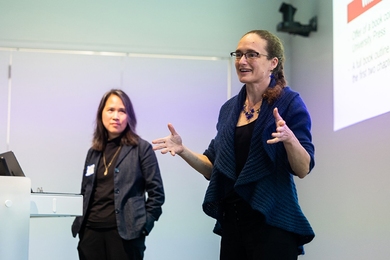Martin Rein, professor in the Department of Urban Studies and Planning from 1970 until his retirement in 2011, died on Oct. 15 of complications from Alzheimer’s disease. He was 89.
Rein was born in Brooklyn, New York, to Eastern European immigrants. After graduating from Brooklyn College in 1950, he got his first job as a social worker with street gangs, which triggered his lifelong interest in writing and doing research on poverty, social planning and reform, and the social work profession.
He enrolled at Columbia University’s School of Social Work, and went on to get a PhD at Brandeis University in 1961. After seven years teaching future social workers at Bryn Mawr College’s Graduate School of Social Work and Social Research, Rein landed at MIT, where he remained for more than four decades.
Rein’s early career was devoted to the study of the welfare state, primarily across European and Anglo-Saxon countries, comparing them in particular to the United States. Every country looked different, with its own complicated rules and programs. Although he was very familiar with the detailed features of programs in many countries, he was also trying to look for patterns across them. Looking beyond the details, were there commonalities across countries, and what were the real differences? He did comparative analyses at various levels, looking at impacts of programs on individuals as well as at the overall structure of programs and institutionally how they functioned.
“As a sociologist working with urban planning students, Marty played a major role in cultivating analytical skills in students who are usually idealistic,” noted Bish Sanyal, professor and former head of the Department of Urban Studies and Planning. “Marty’s research with Donald Schön on problem framing is a book which planners need to read even so many years after the publication of the book. His book on 'Dilemmas of Social Reform' remains required reading for all interested in social policies.”
Later in his career, Rein’s main interest was retirement policy. At the individual level for retirement income, Rein did extensive data analysis of “income packaging.” Retirement income can come from many sources, among them public social security, private pensions and saving plans, and ongoing work. He had individual data on the components of income of the elderly across many countries.
In the aggregate, there seemed to be similarities among countries with large and small public programs, since some countries depended more on private programs. The aggregate resources devoted to retirement — public and private — in the United States, for example, were not much smaller than in countries with larger public welfare states because of extensive private pensions. When Rein examined the top 10 percent of older people or the bottom 10 percent, however, the differences were much more pronounced. Taking account of both public and private income sources, he found large differences in inequality among older people between countries even though aggregates were sometimes more similar. Rein realized that the whole impact of the welfare state could not be understood without taking account of both public and private sources of retirement income.
Within the public sector, Rein was also interested in how programs might not be what they seemed. Countries tend to develop distinct programs to deal with seemingly separate problems, such as unemployment, disability, and retirement. But over time, he concluded that programs developed for one purpose often came to be used for another. For example, unemployment insurance is targeted at unemployment, but when benefits run out in countries with high unemployment, people turn to other programs, seeking to qualify for disability benefits or if they are old enough, for early retirement benefits.
The neat dividing lines that supposedly separate programs tend to blur, and all of these programs can become, in part, unemployment programs. The blurring also can go in other directions. While studying early retirement, Rein noticed that workers who were not yet old enough for retirement programs could effectively withdraw from employment early by drawing on unemployment insurance for a while, or on disability benefits — so the disability and unemployment programs could become in part de facto early retirement programs. Of course, once the blurring became obvious enough, countries would try to take corrective actions, and Rein followed the political responses.
Rein wrote and co-wrote many books on social policy and social reform. Among the most well known were "Dilemmas of Social Reform," with Peter Marris, which became a classic work on the origins of community action, and "Social Policy: Issues of Choice and Change and Frame Reflection," with Donald Schön, which explored why controversies over public policy are so difficult to resolve.
According to Rein’s daughter, her father was an accomplished scholar who was charming, warm, and an extrovert. “He loved Rachmaninoff, a good Gewurztraminer, tending his many orchids, and cooking a good duck confit,” says Lisa Rein, who currently resides in Washington. “He loved Yiddish songs and learned German in his spare time. He never bought a new car.”
Rein is survived by his sister; his two children, Lisa Rein of Silver Spring, Maryland and Glen Rein of Rohnert Park, California; and numerous nieces and nephews, as well as former wives Mildred Rein of Boston and Dalia Marin of Munich, Germany. The family is developing plans for a memorial event; information will be provided on the website of the Department of Urban Studies and Planning when available.






